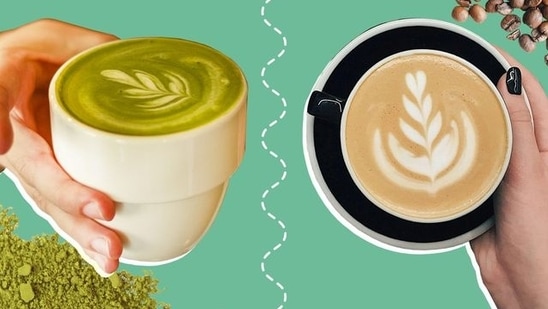
Matcha vs coffee: Which is better for your skin and health goals, promises anti-ageing?
8 months ago | 81 Views
Switching from coffee to matcha can be beneficial for some people depending on their health goals and skin sensitivities as matcha and coffee have different caffeine profiles and contain various antioxidants, which can impact individuals differently. When comparing the effects on skin, matcha and coffee present distinct impacts.
In an interview with HT Lifestyle, Dr Rajeshwari Panda, HOD - Nutrition and Dietetics Department at Medicover Hospitals in Navi Mumbai, shared, “Switching from coffee to matcha can be a good choice if you're looking to reduce coffee intake or benefit from different antioxidants found in matcha. While matcha does contain high levels of antioxidants and may have potential health benefits, it's important to maintain a balanced diet and consider individual health needs. Always consult with a healthcare provider for personalised advice on dietary changes and health benefits.” The health expert elaborated regarding matcha -
1. Antioxidant Content:
Matcha does contain a high concentration of antioxidants, including polyphenols like catechins. It's often claimed to have significantly more antioxidants than regular green tea because when you consume matcha, you ingest the whole ground tea leaf, whereas with regular green tea, you steep the leaves and then discard them. However, the exact polyphenol content can vary widely depending on the quality and preparation of the tea.
2. Anti-Ageing Claims:
While matcha is rich in antioxidants, which are known to combat oxidative stress, there's no direct evidence that matcha reverses aging. Antioxidants can help protect cells from damage but reversing aging involves many factors beyond just antioxidants.
3. Gut Health and Cancer Claims:
Matcha, like green tea, contains compounds that may have beneficial effects on gut health and potentially exhibit anti-cancer properties. Research suggests that the catechins in green tea, including matcha, may have some anti-cancer properties in laboratory studies, but more research is needed to understand their effects in humans, especially when it comes to specific claims like killing breast cancer stem cells.
Bringing his expertise to the same, Dr Subrata Das, HOD - Internal Medicine and Diabetology at Sakra World Hospital in Bengaluru, revealed, “Matcha, rich in antioxidants like EGCG, provides significant protection against free radicals that contribute to skin ageing. Its anti-inflammatory properties may alleviate skin redness and conditions such as acne while supporting collagen production for improved elasticity. Additionally, as a hydrating beverage, matcha helps maintain skin moisture levels. Conversely, coffee, though also containing antioxidants beneficial for skin health, can potentially dehydrate the skin due to its diuretic properties. Excessive consumption of coffee may disrupt sleep, impact skin repair processes, and could exacerbate acne in some individuals by influencing hormonal balance and oil production.”
He concluded, “While both beverages offer antioxidant benefits, matcha's hydrating qualities and potential anti-inflammatory effects may make it a preferable choice for those prioritising skin health. Matcha offers a rich, vegetal taste with a slight bitterness and creamy texture. It's described as earthy and sweet. Coffee, in contrast, provides a bold, varied flavor profile ranging from nutty to fruity, with a strong aroma. Each appeals to different taste preferences and occasions. However, individual responses vary, and factors like caffeine sensitivity and personal taste preferences should also be considered when making dietary choices.”
#




















